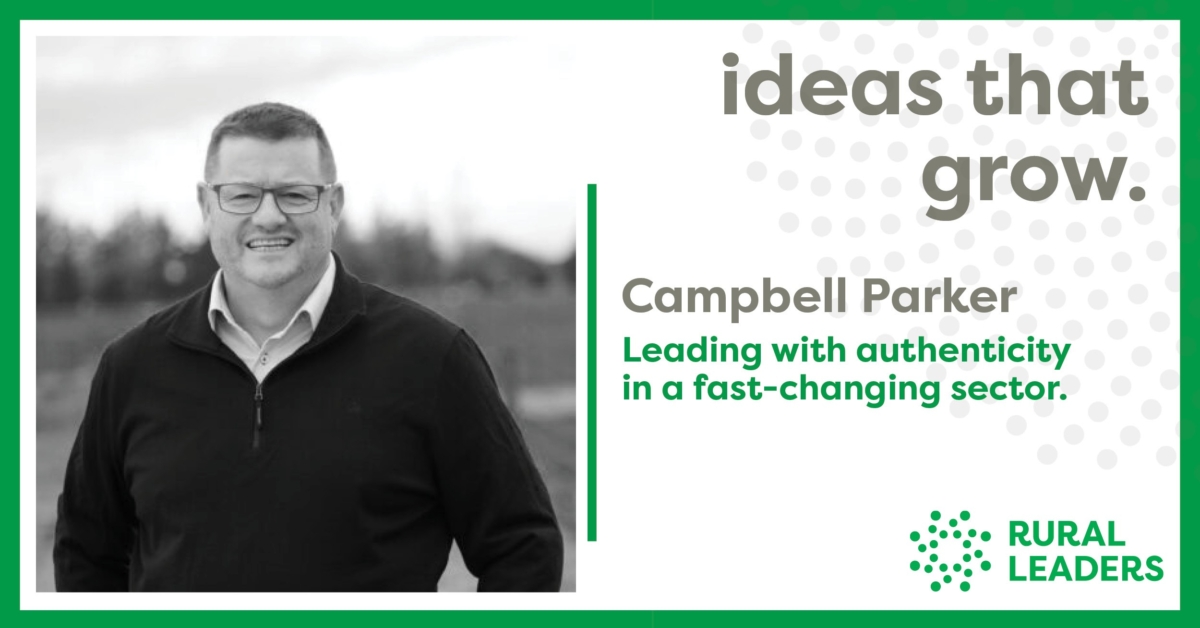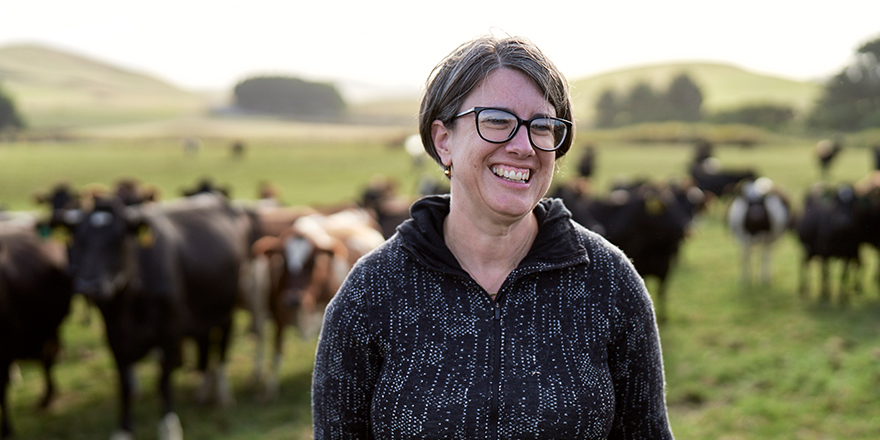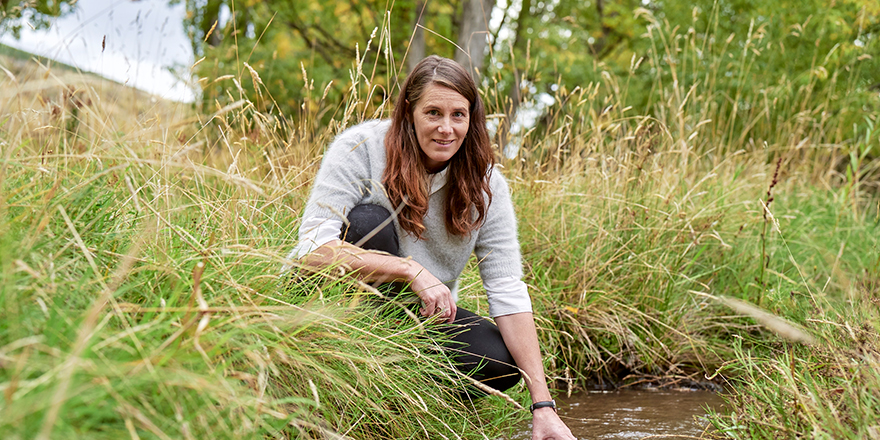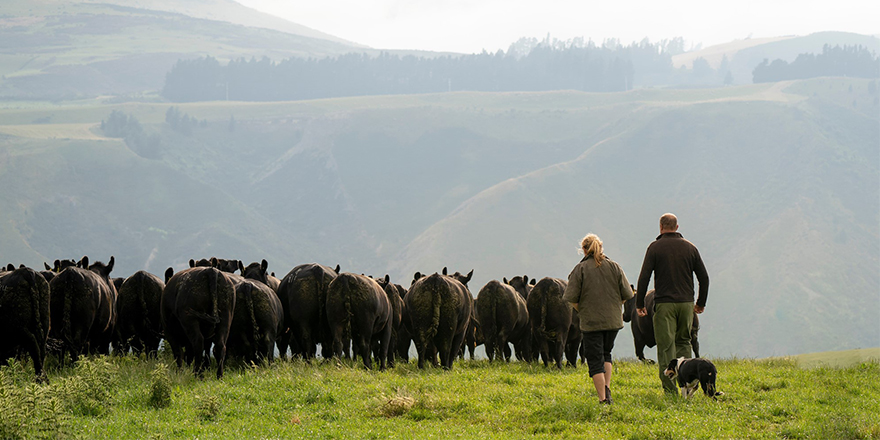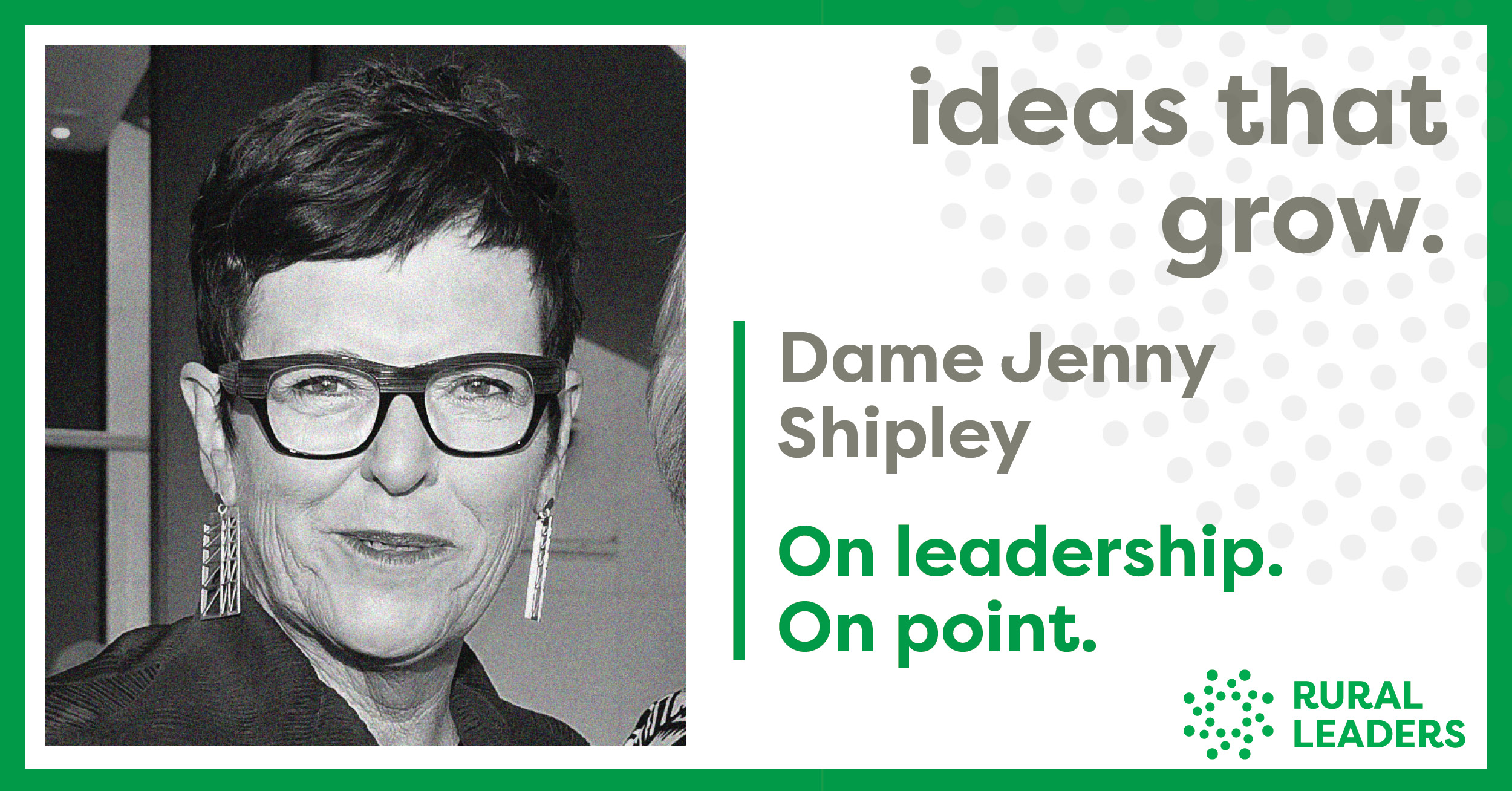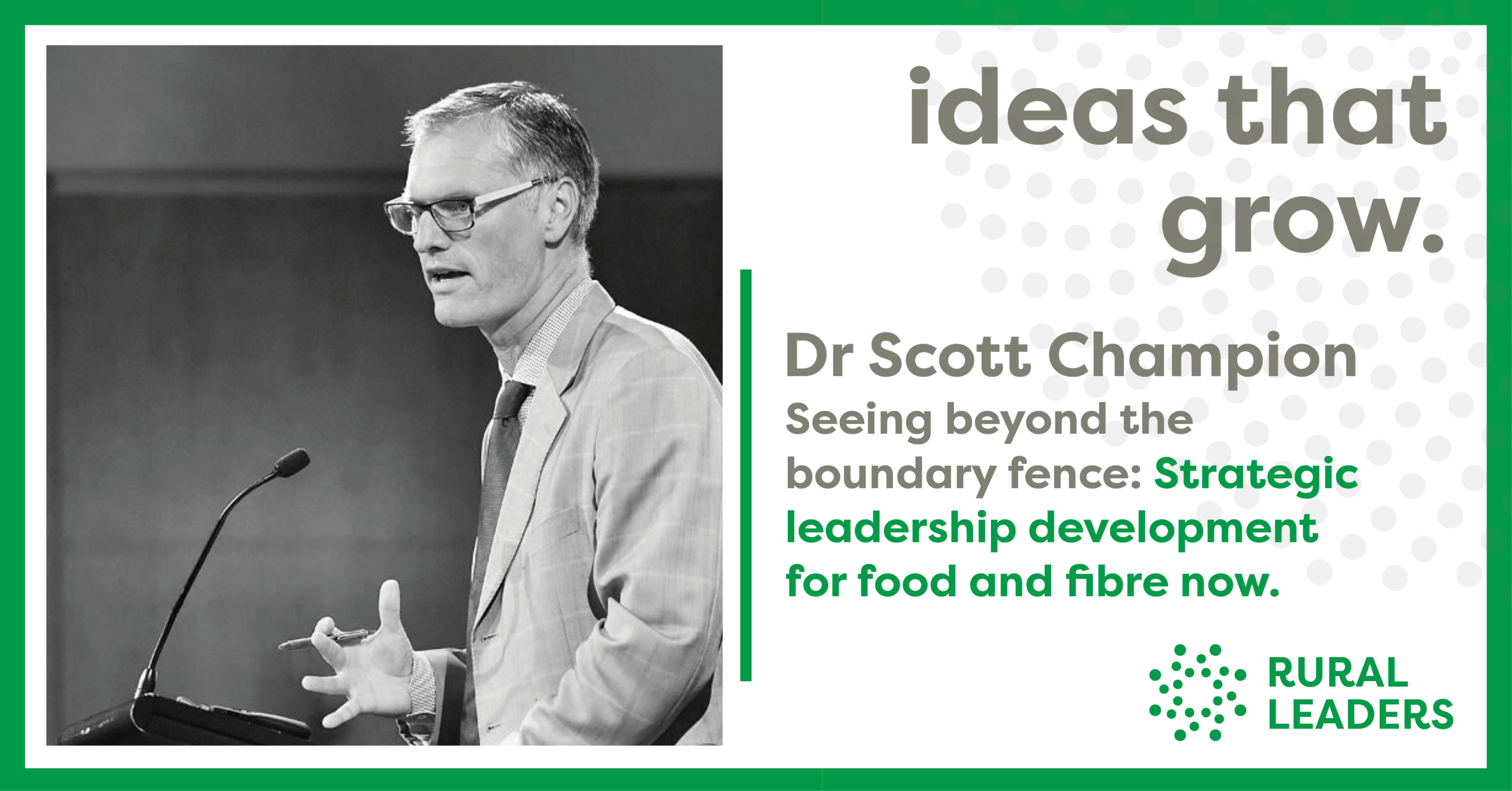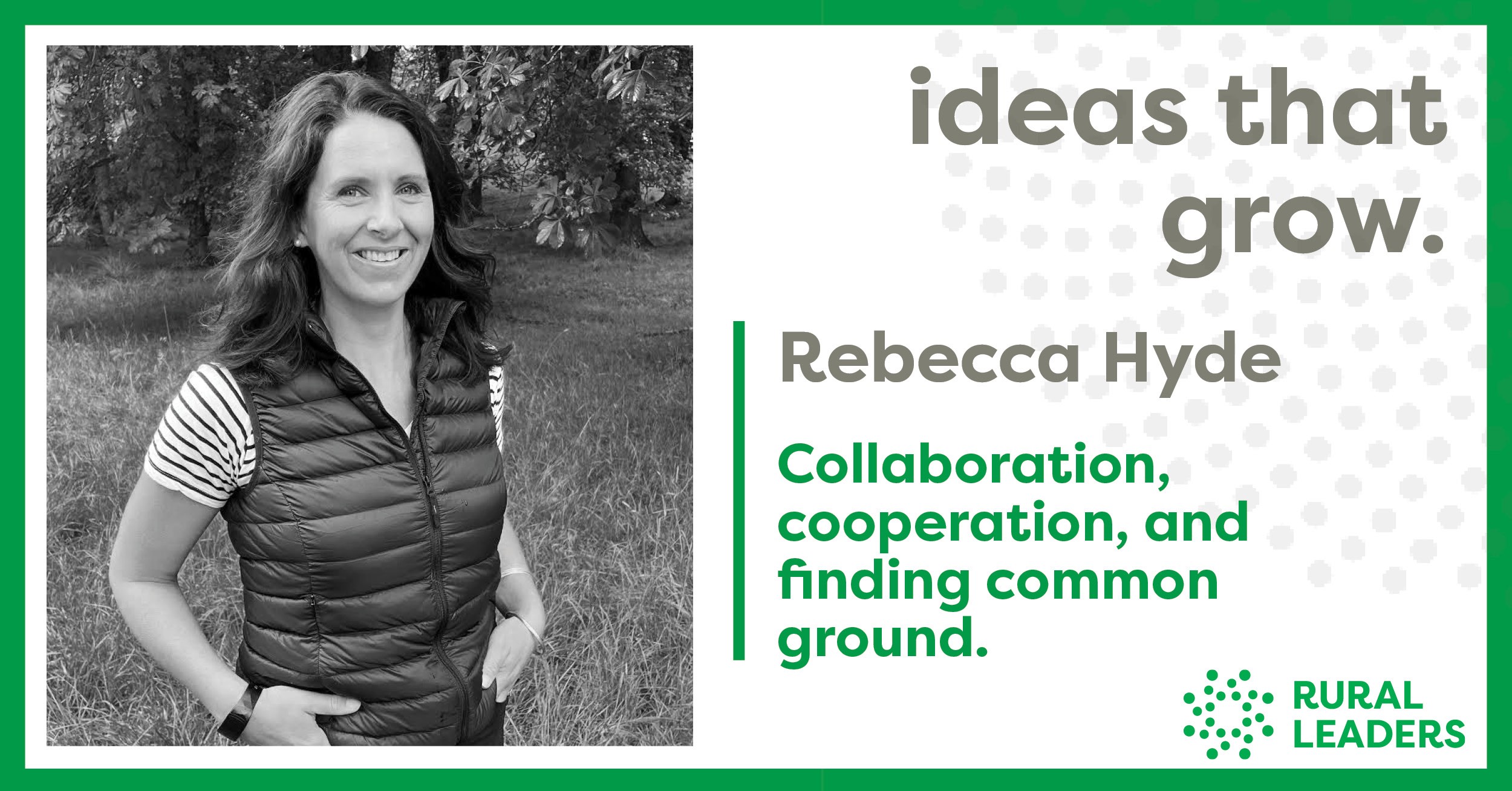Farmers Weekly Managing Editor Bryan Gibson speaks to Campbell Parker, Chief Executive Officer at DairyNZ.
Campbell discusses his involvement with the Kellogg Rural Leadership Programme and how leading with authenticity can go a long way to helping us achieve big things in a time of rapid change.
Listen to Campbell’s podcast here or read the transcript below.
Bryan Gibson – Managing Editor of Farmer’s Weekly.
Kia Ora, you’ve joined the Ideas That Grow podcast, brought to you by Rural Leaders. In this series, we’ll be drawing on insights from innovative rural leaders to help plant ideas that grow so our regions can flourish. Ideas that Grow is presented in association with Farmers Weekly.
Bryan Gibson, Managing Editor of Farmers Weekly.
You’re with Ideas That Grow, the Rural Leaders podcast. I am Farmers Weekly Managing Editor, Bryan Gibson, and with me today is Campbell Parker, Chief Executive of DairyNZ. G’day Campbell, how’s it going?
Campbell Parker, CEO DairyNZ
How are you, Bryan? Yeah, I’m pretty good, thanks.
BG: Now, you’re not an alumnus of the Kellogg or the Nuffield Programmes, but you have been called upon to work with some of the Kellogg cohorts, to talk to them about leadership. What does that involve?
Sharing leadership experiences with Kellogg scholars.
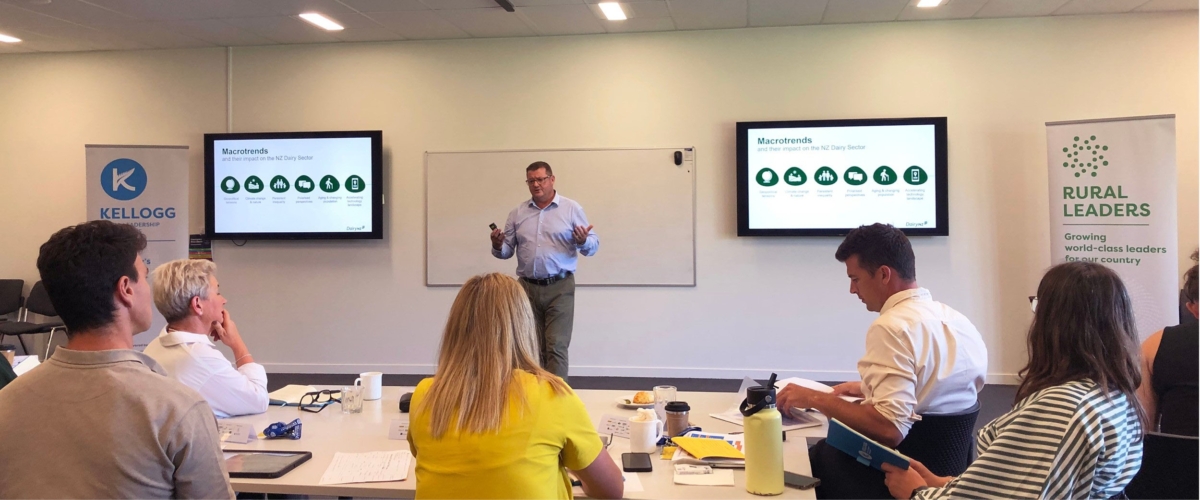
Image: Campbell Parker with 2024 Programme One Kellogg Scholars (K51).
CP: I had the opportunity in the end of January to go down and talk to the most current cohort. They were looking for a view around the dairy industry. Obviously, I’m CEO of DairyNZ, but that was where it started.
Ultimately, what you find in those conversations is that you start talking about the Sector, but then you start talking about leadership. The conversation with them ended up in a very interesting space around what are some of the challenges the sector has and where does leadership fit in.
What I also find interesting with a group like that is they’re interested in your own personal leadership journey and where they are in their own journey. How do we learn together and what is the role of leadership? You always find those sessions really stimulating; when you get to talk about what that is and what are we all trying to achieve from a leadership perspective.
BG: Leadership is an interesting thing. For myself, I hold a leadership position in our business. But to tell you the truth, a while back, I wouldn’t have thought leadership was for me. I’m a quiet person. I’m a listener, like journalists often are.
You quite often don’t marry that to what you stereotypically look for in a leader. What do you think about how leadership has evolved over time and what qualities are important?
Leading well starts with understanding yourself.
CP: I think leadership is an evolving subject, and it continues to evolve. But one of the things I’ve seen, I think people have a frame around what they think leadership is. I personally believe everyone can be a leader. First of all, you’ve got to lead yourself. That’s where it starts.
Some of the best leaders I’ve worked with aren’t necessarily the gregarious and outgoing people. But to sum it up, I think one of the most important traits around leadership is authenticity and being really clear about who you are as a person, what your impact on others is, and how you try and lead people.
It does start with having a good understanding of yourself, what motivates you, what drives you, how you react to certain circumstances, and then ultimately, how do you lead people to be the best that they can be. To me, that authenticity is not necessarily about corporate messages, because the people that have the ability to take people with them are the people that are trusted and are authentic. They have very honest conversations around where things need to be.
If I had to put it down to one thing and one word, I would say authenticity is one of the most important things.
BG: Yeah, I guess people are more likely to believe in and get in behind someone who they feel personally, or in a business sense, has their back, that you’ll be listened to, and that you have the chance to thrive on your own as well as within a collective. That’s really important, isn’t it?
Authenticity is key in a sector with little appetite for BS.
CP: It is. I think I was asked a question by the board when I was going through the interview process for this role. They asked me a question around what are the things you’re most proud of in your career. I said to them, and I was very genuine around this, it’s not an event or something, there’s been lots of those. But what I’m most proud of is the people I’ve had the opportunity to work with and the things that we’ve been able to achieve together. To me, that’s the important part of leadership, because when you work with teams and people, and you achieve something you didn’t think was possible, that’s inspirational.
I remember one person that I worked with externally who used to often say, the biggest limitations are those that we put on ourselves. I think we’re all a lot more capable of things from a leadership perspective than what we think we are. It’s through time and experience that you gage those things and you learn from them. If you’re a continuous learner, you want to continue to grow as a human being – I think if you can do that and do that well, then leadership can be really enjoyed and enjoyable
BG: You don’t know what you’re capable of until you give it a go, I guess. That lifelong learning thing.
CP: And sometimes you’re put into situations that are really challenging. Ultimately, you have to be prepared to make a decision and then live with those decisions, but you also need to be, I think, open enough to reflect on and admit when you didn’t get things right or be vulnerable enough to then change. Because, again, back to that point around authenticity and trust, that gives people the ability to trust you and then come with you.
The one thing I would say in our sector, in agriculture, and particularly with farmers, they’re pretty good at reading the ‘BS’ barometer, and that level of authenticity is incredibly important.
Remaining positive about the Sector’s future.
BG: Now, you mentioned you talked to the Kellogg cohort earlier in the year about some of the issues in our food production sector at the moment. Obviously, it’s been a time of rapid change. We’ve had global events, pandemics, that sort of thing, and also lots of regulation come down from government in the previous term. What do you think is the path going forward? How do we align ourselves to make sure we’re doing the best we can do for our sector?
CP: I think one of the things that we really need to make sure that we continue to do is respect all the really good work that have been done by farmers. This is something that’s really important. It’s not just dairy farmers, that’s all farmers. When I look across the Sector and I look at the progress that farmers have made over the last 10 years, we’re in a very different place today than what we were 10 years ago, particularly when you go to things like on-farm practices, and in the environmental space. You get into animal welfare, all those really important, which are quite big global topics and are not going to go away.
It’s really important that as a sector, we continue to have progress around that because it’s expected, whether it be from global players who buy our products or consumers, ultimately. But equally, when you talk to farmers, farmers care deeply about animals on the land, and they ultimately want to leave it better than what they found it. I think hope around that is really important. This sector contributes so strongly to New Zealand from a GDP, but it’s not just that. It’s not just the financial, it’s the communities.
When farming is doing well, communities thrive, and when communities thrive, towns do well. The whole impact on our nation is incredibly important. Yes, we’ve had some tough times. We’ll go through cycles, and we always have in terms of economic cycles and political cycles. But I think we’ve got to have the courage to continue to be passionate and positive about what our future is, because the world needs high-quality food produced in a way that’s sustainable for the environment.
Our farmers ultimately also need economic returns for that to remain viable themselves. It’s an industry that I certainly find not hard to get out of bed every day and get excited about because it’s got a really, really important role to play.
BG: Just a year or two back, it seemed we had a bit of a flash point, I guess, in terms of rural leadership. It was over the emissions pricing process. A lot of farmers and people in rural communities got the feeling that they hadn’t been communicated to well enough by the people who were advocating for them inside the beltway. That led to changes in leadership in various places. That communication and gaining and representing a mandate, that seems to be really important as you go and represent your community outside of it, if you know what I mean.
Learning from the past.
CP: I agree, and I think it is. I think the reality is if you’re talking around things like He Waka Eke Noa processes and things like that. Look, a lot of people put a lot of effort into those processes and tried to communicate things. Unfortunately, there was a bit of a void, and I think it’s important we learn from that because out of that comes this distrust and this concern around what are we advocating for.
It’s interesting because since being in the role, I’ve talked to a lot of dairy farmers, and a lot of farmers have raised that issue with me. When you reflect back on it and say, well, the alternative was we went straight into the ETS, we ended up with pricing, and we didn’t end up with a split gas approach, do you think we should have played that role? They unequivocally say, Absolutely, you should have. Somehow it got lost in translation. I think we do have to learn and reflect on that. I think we do have a role, particularly as industry good organisations to stand up and be clear about what we do stand for and be prepared to take a leadership position.
I know that from my predecessors and people in the business, that absolutely was the case. Somehow that got lost.
Getting the mojo back.
BG: You mentioned farming being not just a driver of economic wealth, but of social well-being. Often when you hear about farming, though, outside of the likes of the Farmer’s Weekly or that sort of thing, it seems to be always on the defensive, if you know what I mean? Farmers have been accused of this and here’s such-and-such from Federated Farmers to defend themselves. It seems we need to maybe front foot things a bit more and believe in what we are and what we bring and that sort of thing and change the conversation a little bit?
CP: I think as farmers and the industry, should be incredibly proud of what we do as a sector. Also, and look, times are tough. When you look directionally through and not just at the financial, the impact that the sector has on communities, people growing, schools, all those things should not be lost sight of.
If I cast my mind forward, I’m 54, if I go back to when I left school in 1987, post the share market crash, everyone said the agricultural sector was a sunset industry. It has certainly not played out that way, and it’s been really, really important for New Zealand. If I cast my mind then forward, I go, absolutely, will it be important in 15- or 20-years’ time? Absolutely. Can we balance both environmental and profitable outcomes? Absolutely. Lots of farmers are doing that. But somehow, we have to try and have a positive voice and get our mojo back.
BG: It does relate to a top-down approach with the likes of Government regulation, that leaves farmers in a place where they don’t feel in control of their own destiny. They’re being given rules with no contextual meaning. Whereas if, say, the likes of the current process of driven plans around scope-three emissions, they lead to premiums. There’s information from customers around the ‘why’. That seems to be a better way to do things in some ways.
CP: I think you’ve always got to understand the context of what you’re trying to drive in. Self-regulation is always better than regulation. I think as an industry, we’ve got to take responsibility for our role to play in those pieces. We’re signed up to things like the Paris Accord. That’s all okay. We’ve just got to make sure that we are contributing and take ownership for our issues.
I think one of the observations I would make, Bryan, in talking with politicians, whether it be regionally or centrally now, is they don’t only want to know what the problems are, they want to know what the solutions are.
We see ourselves as being part of those solutions. But to your point, when people are uncertain, and that’s why we need enduring policy, that’s fear and pragmatic and can be implemented. We did get too much complexity into some of that space. Some of that’s got to be undone. But we need enduring policy that also gives farmers confidence to invest in the things that they need and to continue the direction of travel. If we don’t have that, then it becomes very hard. Confidence is a really important part of anyone’s psyche.
When you feel good about what you’re doing and you’re upbeat about where things are going, you’re more likely to have a positive mindset.
Kellogg - for leaders who want to make a difference.
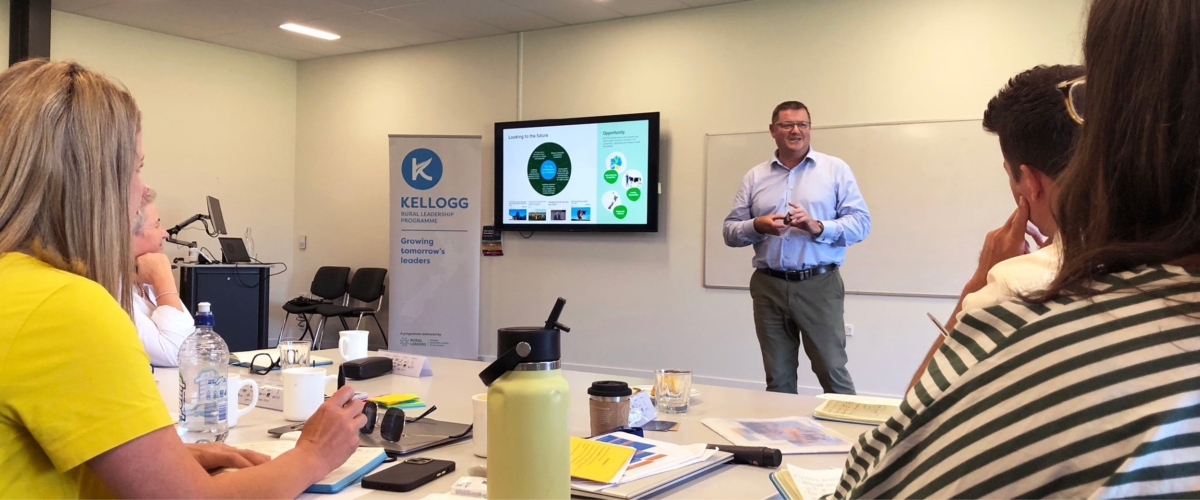
BG: Just going back to your work with the Kellogg Programme, that must have been… I’ve been to a couple of their alumni events, and they’re amazing events because they’re just full of a wide range of people from all different backgrounds, all different professions. But they’re all just incredibly excited about the Programme, about being with each other and what they’re doing. How did you find it?
CP: They’re always energising. You get in a room with this year’s intake. In January, there was probably 20 people in the room. They’re all passionate about what they do. They ask good questions, which is good and challenging. But they’re there for a reason because they want to make a difference, ultimately.
They also want to challenge themselves to grow as leaders. I think any of those programmes that galvanise people towards that, but more importantly, that self-reflection around where you are and how do you grow and how do you learn from others, is a really good thing to be part of.
The alumni piece around how they continue to connect themselves up; I talked with one of our directors, Tracy Brown, and she remembers doing Kellogg 20 years ago, when she was in her early 20s, and the people she went through at that point. She’s gone on to do a Nuffield and sits on our board, and sits on a number of boards. Some of that started with Kellogg. I think that’s where sometimes the passion gets ignited, but they get drawn to do the Programme, generally, because they’re drawn towards doing it for a deeper personal reason.
BG: Thanks for listening to Ideas that Grow, a Rural Leaders podcast in partnership with Massey and Lincoln Universities, AGMARDT, and FoodHQ. This podcast was presented by Farmers Weekly.
For more information on Rural Leaders, the Nuffield New Zealand Farming Scholarships, the Kellogg Rural Leadership Programme, the Engage Programme, or the Value Chain Innovation Programme, please visit ruralleaders.co.nz
